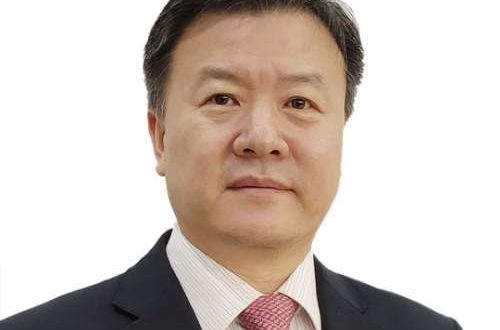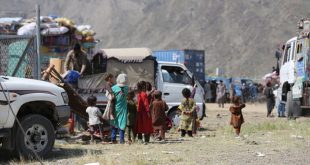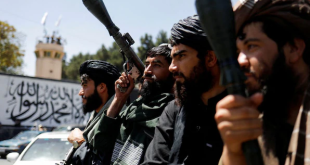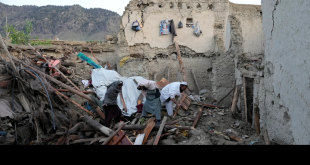By Wang Yu, Chinese Ambassador to Afghanistan
For some time, some people from the US and other Western countries have made groundless accusations against human rights conditions in Xinjiang, China, and disseminated many lies and fallacies, of which eight common fallacies have misled the people of the international community, including Afghanistan. In this connection, I would like to clarify the facts and explain the truth behind it.
False 1: The vocational education and training centers in Xinjiang are “concentration camps” detaining over one million Uyghurs. True: The vocational education and training centers, established in accordance with law in Xinjiang, are useful measures and positive explorations for preventive counter-terrorism and deradicalization. It is a common international practice. The sole criterion of selection by the education and training center is whether the candidate had been involved in an illegal or criminal act of terrorism or religious extremism. It has nothing to do with the person’s place of residence, ethnicity or faith. There is no such thing as “suppression on ethnic minorities” or “persecution of Muslims”. As for the so-called “1 million” figure, it is purely made up by some people from the US and other Western countries. One of the source is from a “study” by a US and other Western countries government-backed think tank who only interviewed only eight people. The other source is from a “report” by a US and other Western countries government-backed Foundation who cited from a separatism organization. These so-called think tanks and foundations have seriously deviated from the spirit of scientific research and become the political and propaganda tools of the US and other Western countries.
False 2: The vocational education and training centers in Xinjiang carried out “political indoctrination and intimidation” over the Uyghurs and other ethnic minorities. Ture: The vocational education and training centers in Xinjiang provided courses on standard spoken and written Chinese language, legal knowledge, professional skills and deradicalization, to address the inadequate language proficiency, lack of legal literacy and job skills, as well as the varying degrees of religious extremism influence among their trainees. The purpose of the centers is to tackle terrorism and religious extremism at the root, and has achieved good results. Through all-round learning, the trainees have freed themselves from the influence of terrorism and religious extremism. Their employability has been improved, and most of them have found jobs that give them a stable income, and notably improved their families’ living standards.
False 3: The vocational education and training centers are poorly conditioned and lack medical facilities. The trainees are subjected to forced political indoctrination and torture, and are deprived of their rights to exercise religious customs, use local ethnic languages among others. True: The vocational education and training centers strictly follow the basic principle of respecting and protecting human rights enshrined in China’s Constitution and other laws. Trainees’ personal freedom is fully respected, and they may go home on a regular basis. Trainees’ freedom of religious belief is fully respected, and they can decide on their own whether to take part in legal religious activities when they are at home. Trainees’ customs is fully respected, and they can select from a rich variety of nutritious halal food free of charge. Trainees’ right to use the spoken and written languages of their own ethnicity is fully protected, and all regulations, curricula and canteen menus at the centers are written in local ethnic languages. The centers have well-equipped facilities, dorms are furnished with radio, television, and air conditioning or electric fans, and there are various of venues for sports, cultures as well as performances.
False 4: Xinjiang’s special operations against violent terrorist activities aim to suppress ethnic minorities under the pretext of fighting terrorism. True: Statistics show that from 1990 to 2016, ethnic separatists, religious extremists and violent terrorists plotted and conducted several thousand violent terrorist cases and incidents, killing a large number of innocent civilians and several hundred police officers, and causing immeasurable property losses. Through law-based counter-terrorism, deradicalization and vocational education and training, Xinjiang has not seen a single violent terrorist case in the past three-odd years. Extremist infiltration has been effectively curbed, public security significantly improved and people’s sense of fulfillment, happiness and security markedly enhanced.
False 5: Mass forced labor against ethnic minorities is taking place in Xinjiang. True: The stories were cooked up by some institute from US and other Western countries, which has been spurned by many dignitaries and people in many countries. There are only limited job opportunities in the four southern Xinjiang prefectures (Hotan, Aksu and Kashi prefectures, and Kizilsu Kirgiz autonomous prefecture) as industrialization and urbanization there are underdeveloped. The government of the Xinjiang Autonomous Region has taken measures based on the wishes of local people to help them find jobs in their hometowns. Since 2018, Xinjiang has helped 151,000 surplus rural workers from poor families in the southern prefectures to find employment elsewhere. With an average annual income of over 6428 USD, these workers have all been lifted out of poverty.
False 6: Xinjiang has demolished a large number of mosques. True: There are 24,400 mosques in Xinjiang today, which has grown 10 times more than 40 years ago. There is a mosque for every 530 Muslims on average. Xinjiang takes the preservation and maintenance of mosques very seriously. Some cramped and dilapidated mosques, those with poor layout designs and those inconvenient for religious activities have been rebuilt, relocated or expanded in light of the needs and wishes of local Muslim communities. Such adjustments have been welcomed by religious leaders and believers.
False 7: The local government sends Uyghur children to boarding schools and separates them from their parents. True: The boarding school system is an effective means to improve education in China’s remote areas and ease the burden on students and their families. In Xinjiang, students of all ethnicities attend schools closest to their homes. Those living near the campus can be commuter students. For those living further away, schools provide them with free accommodation, plus free meals for those from rural families. It is up to the students and their parents to decide whether to live on or off campus.
False 8: The Chinese government’s brutal crackdown on Muslims is a human rights violation not seen since World War II. True: Under a system of ethnic regional autonomy, China treats all ethnic groups equally and pursues prosperity and development for people of all ethnicities. The Xinjiang Uyghur Autonomous Region is home to 25 million people of different ethnic groups who live and work in harmony. Among them, ten ethnic groups, including Uyghur and Hui, consist mainly of Muslims. The Muslim population has been growing steadily, accounting for nearly 60% of the total local population. In Xinjiang, every chairperson of the People’s Congress, the autonomous regional government, and the CPPCC regional committee is from ethnic minority groups. Ethnic minorities take 64.2% of the seats in the 13th Xinjiang People’s Congress, and 46.7% of the seats in the 13th CPPCC Regional Committee of Xinjiang. The freedom of religious belief of all people, regardless of their ethnicity, is fully protected in accordance with law. Believers and non-believers enjoy the same political rights and economic, social and cultural rights.
Falsehoods find no market among the fair-minded, as we are confident that people will tell right from wrong! No matter how vilified and smeared by the US and other Western countries, the solid achievements made in the cause of human rights and economic and social development in Xinjiang are there for all to see. I hope that through this article, Afghan friends will clearly see the various fallacies and tricks of the US and other Western countries, resist interference in the internal affairs of other countries under the pretext of human rights, and jointly safeguard the peace and stability of Xinjiang.
 Afghanistan Times
Afghanistan Times




